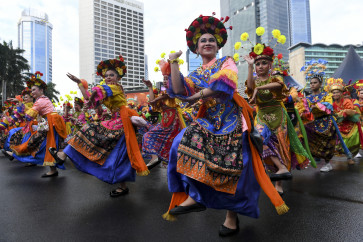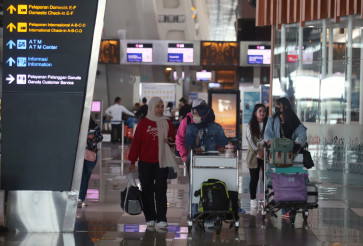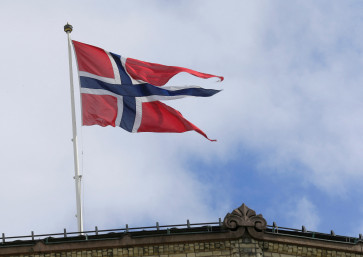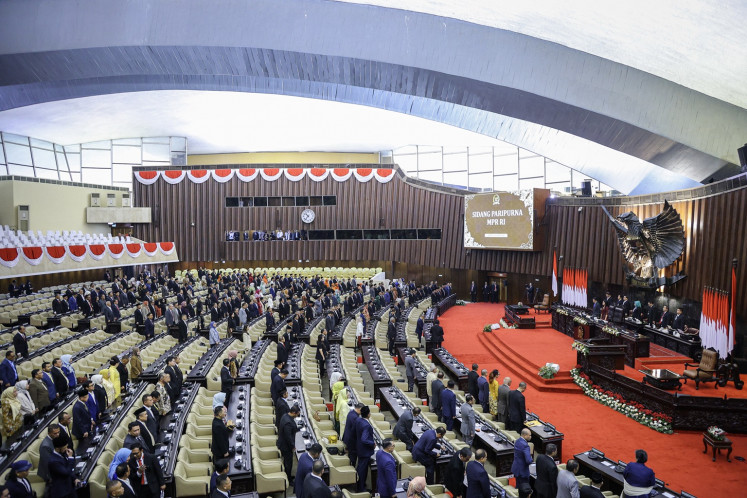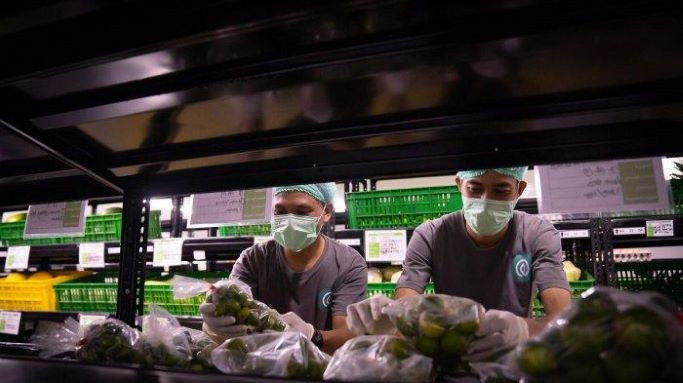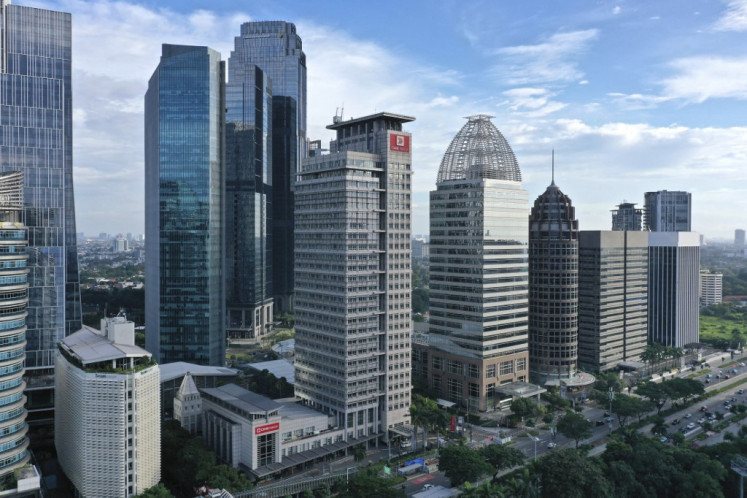Popular Reads
Top Results
Can't find what you're looking for?
View all search resultsPopular Reads
Top Results
Can't find what you're looking for?
View all search resultsFatmawati residents suing deputy governor
Go underground: South Jakarta residents rally outside the Japanese Embassy in Central Jakarta on Friday, against the city governmentâs plan to build an elevated mass rapid transit (MRT) system they fear would cause environmental chaos in their areas
Change text size
Gift Premium Articles
to Anyone
 Go underground: South Jakarta residents rally outside the Japanese Embassy in Central Jakarta on Friday, against the city governmentâs plan to build an elevated mass rapid transit (MRT) system they fear would cause environmental chaos in their areas. They insisted that Japan, the projectâs main financier, convinced the local government that an underground MRT system would be better. (JP/PJ. Leo) (MRT) system they fear would cause environmental chaos in their areas. They insisted that Japan, the projectâs main financier, convinced the local government that an underground MRT system would be better. (JP/PJ. Leo)
Go underground: South Jakarta residents rally outside the Japanese Embassy in Central Jakarta on Friday, against the city governmentâs plan to build an elevated mass rapid transit (MRT) system they fear would cause environmental chaos in their areas. They insisted that Japan, the projectâs main financier, convinced the local government that an underground MRT system would be better. (JP/PJ. Leo) (MRT) system they fear would cause environmental chaos in their areas. They insisted that Japan, the projectâs main financier, convinced the local government that an underground MRT system would be better. (JP/PJ. Leo)
G
span class="caption" style="width: 510px;">Go underground: South Jakarta residents rally outside the Japanese Embassy in Central Jakarta on Friday, against the city government's plan to build an elevated mass rapid transit (MRT) system they fear would cause environmental chaos in their areas. They insisted that Japan, the project's main financier, convinced the local government that an underground MRT system would be better. (JP/PJ. Leo)
A group largely comprised of business people on Jl. RS Fatmawati in South Jakarta, reported Deputy Governor Basuki 'Ahok' Tjahaja Purnama to the Jakarta Police for allegedly lying to the public regarding the development plan of the Mass Rapid Transit (MRT).
Lieus Sungkharisma, a representative of the Masyarakat Peduli MRT (MRT Community), accused Basuki for breaching his campaign promise to build an underground system in the business area.
On the police report dated July 22, Lieus, among the first Chinese Indonesians who set up a political party after the fall of the New Order Regime in 1998 ' the now defunct Chinese Reform Party (Partai Reformasi Tionghoa) ' said the group used clause 1 of article 28 of the 2008 Information and Electronic Technology (ITE) Law on spreading false news to public.
Meanwhile, Basuki took the report lightly, saying that the group was free to exercise their right to report him to the police.
He said he did not feel he had broken any campaign promises. Basuki and Governor Joko 'Jokowi' Widodo were sworn in last October.
'I only promised Jakarta would be free of traffic jams and that is what I have been aiming to achieve, including constructing the MRT,' he said.
Basuki said during the campaign, the group members told him that the elevated track was not necessary because the funds for the first phase of the MRT construction would be enough to build an underground track.
'I would love to see a total underground construction for the MRT, but it turns out that the underground track is too expensive,' he said.
Basuki said he had received earlier accusations from the group.
'They once said I had conspired with the firms that would build the MRT project,' he said.
The first phase of the MRT track, which will connect Lebak Bulus, South Jakarta, to the Hotel Indonesia (HI) traffic circle in Central Jakarta, will be funded by a ¥125 billion Japanese, (US$1.27 million) soft loan from the Japan International Cooperation Agency (JICA).
The central government will repay 49 percent of the loan while the administration will pay the rest over a loan period of 40 years, a grace period of 10 years and at an interest rate below 1 percent per year.
The Rp 3.6 trillion project will have seven elevated stations from Lebak Bulus to Jl. Sisingamangaraja and six underground stations from Bundaran Senayan to the HI traffic circle.
The track, which will have a capacity of 173,000 passengers per day, is expected to be ready by 2017.
Basuki said the elevated construction was necessary because expensive underground construction would affect the fares.
'It will be useless to build an expensive public transportation system, because people who have motorcycles and cars will not shift to it,' he said.
During the launch of the MRT project in May, the same group staged a protest against the construction plan of elevated stations that would go through their area.
The project 'will affect businesses in our area and it will turn our area into a slum', Derryl Imanali, a protester, said.
Jakartans have been waiting to have a subway system in the country for years to tackle the notorious congestion and air pollution.
A 2004 study by JICA forecasted that Jakarta would face total traffic gridlock in 2020 if the city did not improve its transportation system. The economic losses from the gridlock, was predicted to reach Rp 65 trillion (US$6.3 billion)
per year.
Several city projects have faced protests from residents. Among others the overpass connecting Jl. Antasari and Blok M in South Jakarta, and the busway route along the Pondok Indah residential area.

